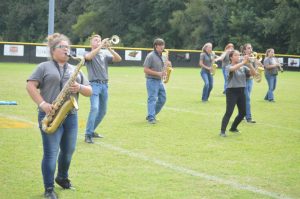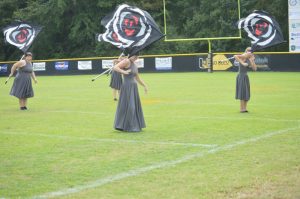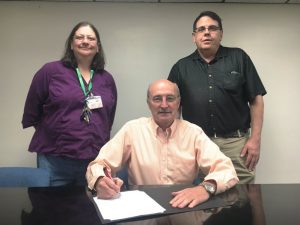News
July DeKalb Jobless Rate at 4.9%
September 2, 2018
By: Dwayne Page
DeKalb County’s unemployment rate for July was 4.9%, down from 5% in June and the same as July, 2017.
The local labor force for July was 7,960. A total of 7,570 were employed and 390 were unemployed.
Jobless rates for June among the fourteen counties in the Upper Cumberland region were as follows from highest to lowest:
Van Buren: 5.7%
Jackson: 5.4%
Clay: 5.2%
Fentress: 4.9%
DeKalb: 4.9
Warren: 4.8%
Overton: 4.6%
Cumberland: 4.5%
Pickett: 4.5%
White: 4.3%
Putnam: 4.2%
Macon: 4.2%
Cannon: 3.8%
Smith: 3.4%
The unemployment rate in 57 Tennessee counties improved in July 2018, according to statistics released today by the Tennessee Department of Labor and Workforce Development (TDLWD).
The unemployment rate remained the same in 19 counties when compared to June and the number of unemployed Tennesseans increased in 19 counties.
“The summer months significantly impact the unemployment situation across the state,” said TDLWD Commissioner Burns Phillips. “People are not working seasonal jobs, they’re out of town and not able to work, or they’ve just graduated and are looking for work. There are many factors that play a role in summer unemployment figures.”
Sixty-two counties had unemployment rates below 5.0 percent in July, while 33 counties had a rate of 5.0 percent or greater.
Once again, Williamson County had the lowest unemployment rate in Tennessee. The county’s July rate of 2.9 percent was down 0.1 of a percentage point when compared to the previous month. The county’s unemployment rate was also 2.9 percent in July 2017.
Davidson County had the state’s second-lowest unemployment rate during July; it decreased by 0.1 of a percentage point and came in at 3.0 percent. The top ten counties with the lowest unemployment each had a rate of 3.5 percent on less.
Weakly County experienced a significant jump in unemployment in July. Its rate of 7.6 percent was a 2.6 percent increase compared to June. In a year-to-year comparison, the July 2018 figure was just 0.5 of a percentage point higher than it was in 2017.
Last month, Lauderdale County had the highest rate of unemployment in the state. During July the county experienced a slight decrease in its jobless rate; the figure dropped 0.1 percentage point to 6.9 percent.
Eight of the top ten Tennessee counties with the lowest unemployment surround Davidson County, while Knox and Sevier Counties round out the list. Seven of the state’s counties with the highest unemployment rate is located in West Tennessee, with the remaining three in East Tennessee.
Tennesseans who are searching for employment may find a variety of valuable resources on the state’s workforce website.
DCHS Band Performs in Upperman Exhibition
By: Bill Conger
The DeKalb County High School Fighting Tiger Band is small in number this year but powerful in performance. With 36 members, Band Director Tracy Luna and Assistant Band Director Jonathan Holland took the marching band to Baxter Saturday (September 1) for the Upperman Exhibition.
“I think the band ramped it up today and did great,” Tracy Luna told WJLE following the band’s performance. “Friday night they went to Stone Memorial, and they weren’t quite on their game, but today they put it all together. The focus was there, and they produced a great product for an early run during the season.”
Area bands converged on the football field at Upperman High School to display their talents. Around mid-day storms forced the musicians to move inside to the gym where they performed an adjusted version of their field show. DeKalb’s first contest of the season will be in two weeks for the Cumberland County Invitational in Crossville.
Luna says the students put in a lot of hard work for an eight minute show, but it pays off.
“We spend two weeks in band camp getting music, and what we call drill, which is pictures with movement and music together,” Luna said. “It’s generally long hours for just an eight minute show, but when it’s all said and done, the kids wouldn’t do anything else. I wouldn’t do anything else. It’s worth it.”
“We practice three times a week, and we work on pictures, which means that on a football field, we divide it up into a grid, and they all have different coordinates that they memorize that go along with music. It’s kind of complicated, but the kids get used to it, and before long they’re professionals at it.”
“Phantom of the Opera” is the band’s 2018 marching band theme
I’ve never done “Phantom of the Opera.” I’ve always loved the musical, and I thought the kids needed to be exposed to the good quality Broadway music. It’s music that people can sing and hum and can remember. It’s not off the wall. It’s very popular with a crowd. I thought too this was a good year to do it. I have the brass to do it, and we pulled it off.”
The D.C.H.S. band will perform next at the Tigers’ football game against Watertown Friday night
DeKalb Suicide Rate 5th Highest in Tennessee
September 1, 2018
By: Dwayne Page
DeKalb County had the 5th highest suicide rate among the state’s 95 counties for the year 2016 and it was 2nd highest in the 14 county Upper Cumberland Region according to statistics reported by the Tennessee Suicide Prevention Network.
In 2016, the latest year for which county-specific figures are available, DeKalb County’s age-adjusted suicide rate was 41.3 per 100,000 people, translating into eight reported suicide deaths. That is up from 26.1 per 100,000 or five reported suicide deaths in 2015 and significantly up from 15.6 per 100,000 people or three reported suicide deaths in 2014.
The DeKalb suicide rate is also higher than the state average of 16.2 per 100,000 population for 2016.
On Friday, County Mayor Tim Stribling signed a proclamation designating September as Suicide Prevention Month in DeKalb County. Lena Higgins and Mark Allison of the Cookeville Upper Cumberland region of the Tennessee Suicide Prevention Network joined County Mayor Stribling for the signing.
In Tennessee, more than 1,000 men, women, and children die by suicide each year.
Suicide is the 10th leading cause of all deaths in Tennessee and the second-leading cause of death among people ages 10-24. According to the Tennessee Department of Health, there were 1,110 recorded suicide deaths in the state in 2016, at a rate of 16.2 per 100,000 people. That’s up from 16.1 per 100,000 in 2015.
Clay County had the highest suicide rate among the fourteen counties of the Upper Cumberland Region at 51.7 per 100,000 with four deaths. Jackson County had the lowest rate in the Upper Cumberland with no reported suicides in 2016. The next lowest was Fentress County at 5.5 per 100,000 with 1 death.
Hardeman County was the only other county in the state to report no suicides in 2016.
Lewis County led the state among the 95 counties in reporting the highest suicide rate at 67.2 per 100,000 with eight deaths.
DeKalb County’s suicide rate was at 16.6 per 100,000 in 2006 and 2007 with three deaths each of those years. But the rate soared to 48.1 per 100,000 in 2008 with nine deaths. The rate dropped to 26.5 per 100,000 with five deaths in 2009 but went back up to 37.4 per 100,000 with seven deaths in 2010. DeKalb’s suicide rate for 2011 was 26.5 per 100,000 with five deaths and 15.9 per 100,000 in 2012 with three suicides and 15.7 per 100,000 in 2013 with three deaths.
In almost all cases, suicide can be traced to unrecognized, untreated, or poorly treated mental illness. It can happen to people of either sex, any race or ethnicity, and any economic status. The average suicide death leaves behind six survivors—family and friends of the deceased—all of whom are at increased risk for a suicide attempt themselves. As if the emotional and psychological toll were not enough, suicide and suicide attempts cost the state of Tennessee $1 billion a year in medical treatment, lost wages, and lost productivity.
The Tennessee Suicide Prevention Network (TSPN) and its allies in the public health, mental health, and social service fields are joining forces to recognize the month of September as Suicide Prevention Awareness Month. During this annual observance, TSPN and its allies arrange several educational and memorial events across Tennessee. These projects help teach the general public about the problem of suicide and how it can be prevented. They also provide an opportunity to remember those lost to suicide; to encourage survivors of suicide, survivors of suicide attempts, and people who have triumphed over mental illness; and to recognize individuals who have made notable contributions to suicide prevention efforts in our state.
Details about the Suicide Prevention Awareness Day observance and other events planned across the state will be announced on the TSPN website (www.tspn.org). Additional information about Suicide Prevention Awareness Month is available from the TSPN central office at (615) 297-1077 or tspn@tspn.org.
You can reach out for help and hope by contacting the crisis text line. Simple text “TN” to 741 741.
« First ‹ Previous 1 2136 2226 2234 2235 22362237 2238 2246 2336 2493 Next › Last »













